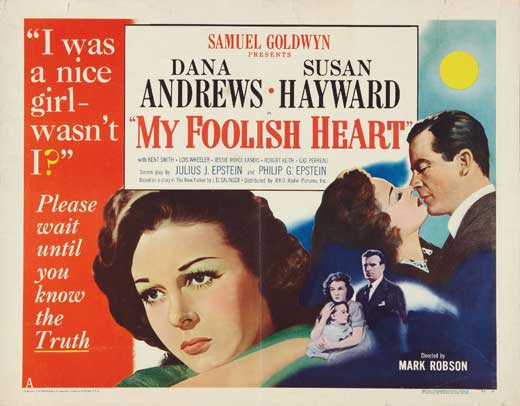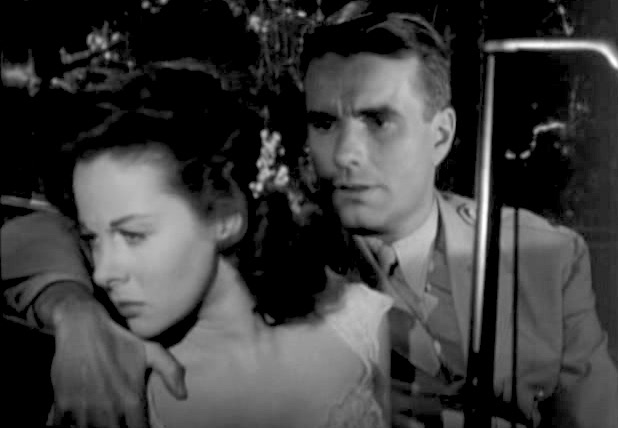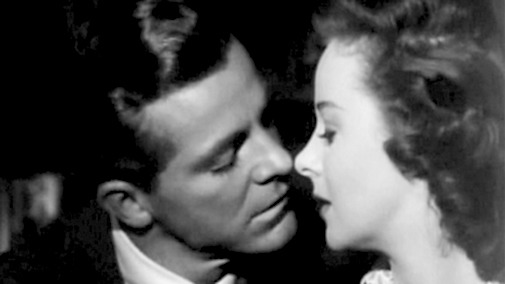Susan Hayward in "My Foolish Heart"
 Wednesday, June 28, 2017 at 9:47PM
Wednesday, June 28, 2017 at 9:47PM SUSAN HAYWARD CENTENNIAL WEEK

by Timothy Brayton
Yesterday, Eric did an extraordinary job of tackling Susan Hayward's performance in I'll Cry Tomorrow (1955), which I think a lot of us might agree was her all-time best performance. Today, I'd like to offer up what I consider to be her most Susan Haywardiest performance: as the good girl-turned-wretched alcoholic in 1949's My Foolish Heart, the film that netted Hayward the second of her five Oscar nominations.
It's a story tailored with laser focus on letting the lead actress show off Everything with a capital "E"...

Hayward's foolish heart goes from virginal innocent to sarcastic, biting drunk, with a nice stop-over in '30s-style "Fallen Woman" mode.
We first meet Eloise Winters (Hayward, of course) near the end of her story, unhappily married to Kent Smith's Lew Wengler, and quite thoroughly smashed-up on what seems to be a lifetime of drinking. It's putting Hayward's very best foot forward: in a career that went just all over the place, she was always at her best diving headlong into the raging misery of crippling chemical addiction, and it's entirely possible that she never did it better than right here.
What sets Hayward's performance in My Foolish Heart apart from her later, ever-more-explicit bids to win one of those damned Oscars already, is that she's not so interested in leaning on the tragic elements of the story. No, the Eloise we meet right off the bat isn't someone whose life we'd like to have for ourselves, and yes, Hayward is certain to foreground that in her bitter growling and pared-down sloppiness. She gets at something unusually realistic, by '40s standards, about the viciousness of alcoholism; but that includes the secret, angry pleasure it gives to the alcoholic. That's what's missing even from something as great as her work in I'll Cry Tomorrow: that savage kernel of glee in knowing that even if her own life has gone to hell, at least she can take other people down with her.
 That's only a fraction of what My Foolish Heart hands over to Hayward, though it's decidedly what she's best at. And that gets to what we might call the Susan Hayward Problem, which is that throughout her career, it seems like she was an awfully tricky person to cast right. Take a look at any of her 1940s publicity shots, and she looks like a fairly standard glamor girl, the kind who gets secondary roles as the leading lady's sassy best friend, or rival. It certainly doesn't seem too much of a leap to think she could work out well as a small-town ingénue type.
That's only a fraction of what My Foolish Heart hands over to Hayward, though it's decidedly what she's best at. And that gets to what we might call the Susan Hayward Problem, which is that throughout her career, it seems like she was an awfully tricky person to cast right. Take a look at any of her 1940s publicity shots, and she looks like a fairly standard glamor girl, the kind who gets secondary roles as the leading lady's sassy best friend, or rival. It certainly doesn't seem too much of a leap to think she could work out well as a small-town ingénue type.
The problem comes in that even from an early age, Hayward clearly had an interest in troubled psychological darkness that her belied her simply pretty looks. She thrives on playing edgy, destructive sorts, if not necessarily addicts, then at least women with a rage and fire inside of them. Elsewhere in 1949, for example, we find her at the center of the proto-Dallas Western melodrama Tulsa, giving her best un-nominated performance as, basically, the female version of Daniel Day-Lewis in There Will Be Blood. Nevertheless, her career is littered with more straitlaced roles. At her most ambitious, as in My Foolish Heart, she spends the film's extensive flashback to Eloise's simpler, more romantic girlhood trying to lay the bedrock for the dipsomaniacal fireworks to come, layering in thorny underbrush.
It's fascinating, there's no doubt about that. As to the question of whether it works or not, I can't honestly say that it does. As Eric points out, in I'll Cry Tomorrow, "Hayward drives the film past melodrama". In My Foolish Heart, she doesn't, no matter how hard she tries. For that we can maybe blame the more generic story, the weakness of the earliest scenes, where Hayward fails to convince as an untroubled young lover, or her relative lack of star power, preventing her from overwhelming the production as she would her projects in the mid-to-late '50s.

What we end up with is a whopper of a performance that doesn't always gel in a movie that has absolutely nothing else to recommend itself other than that performance. My Foolish Heart is notable as the only feature ever adapted from the works of J.D. Salinger, and it was precisely in reaction to what he saw at this film's artistic failure that he refused to entertain the thought of any further adaptations. A little extreme, no doubt, but it's impossible to pretend that My Foolish Heart is great cinema or great melodrama. As a showcase for Hayward at her most dynamic (and her most interestingly compromised), though, it can't be topped.



Reader Comments (12)
This is no masterpiece but Susie makes it worth at least one view. She could be gentle on screen, see The President's Lady for that, but even then there was an underlying grit which was indigenous to who she was as a performer and from what I've read as a private person.
Her star power might not be fully seasoned just yet but she's strong enough to simply plow right over Kent Smith and most of the rest of the cast. The most interesting relationship in the film isn't between Hayward and either of the two leading men but she and her father, the always reliable Robert Keith. They have a warm honest connection and the best scene in the film is a very frank talk, for a 40's film, about the perils of quick wartime marriages and settling for what you have rather than pursuing what you want.
The movie isn't a waste of time but it's not a lost classic either.
By the way LOVING the centennial tribute to one of my favorite actresses!
Susan Hayward and Dana Andrews together in a black & white movie - nothing can go wrong.
A boring movie and an almost boring performance, not worthy any discussion or even the nomination. But 1949 was a horrible year, so the nomination fits in a way.
Look at:
Setsuko Hara in „BANSHUN“ (Japan)
Isa Miranda in „LE MURA DI MALAPAGA“ (Frankreich/Italien)
Lea Padovani in „CHRIST IN CONCRETE“ (Großbritannien)
Valentina Cortese in „THIEVES' HIGHWAY“ (USA)
Patricia Neal in „THE FOUNTAINHEAD“ (USA)
Barbara Bel Geddes in „CAUGHT“ (USA)
Jennifer Jones in „MADAME BOVARY“ (USA)
Joan Bennett in „THE RECKLESS MOMENT“ (USA)
Olivia de Havilland in „THE HEIRESS“ (USA)
Kathleen Byron in „THE SMALL BACK ROOM“ (Großbritannien)
Madeleine Robinson in „UNE SI JOLIE PETITE PLAGE“ (Frankreich)
Silvana Mangano in „RISO AMARO“ (Italien)
Katharine Hepburn in „ADAM'S RIB“ (USA)
Linda Darnell in „A LETTER TO THREE WIVES“ (USA)
Ann Sothern in „A LETTER TO THREE WIVES“ (USA)
Jane Greer in „THE BIG STEAL“ (USA)
Lizabeth Scott in „TOO LATE FOR TEARS“ (USA)
Gene Tierney in „WHIRLPOOL“ (USA)
Yvonne De Carlo in „CRISS CROSS“ (USA)
Audrey Totter in „THE SET-UP“ (USA)
Ann Sothern in „A LETTER TO THREE WIVES“ (USA)
and then think about the performances of Jeanne Craine in "Pinky", Susan Hayward in "My foolish Heart" and Loretta Young in "Come to the Stable"
Deborah Kerr is wonderful in "Edward, my Son" - but she is more of a supporting role.
So far, this Susan Hayward tribute series has also been a mini-tribute to melodramatic taglines on Susan Hayward movie posters. Keep them coming!
Brevity -- the other one for this same movie is awesome...
Man, these old movie posters are the best things in life!
This blog needs more classic melodramas, I need more classic melodramas, everybody, the world... Please... More, more, more!...
I really need to see this. For a fan of old movies, I'm woefully behind in my Hayward viewing. She has never been my cup of tea; I honestly think she's outright bad in I Want To Live! I can't get at all what she's doing in that. Still, she's got a great reputation for a reason.
My Top Ten Melodramas By Now
1-An Affair to Remember (Almost a romantic comedy)
2-Humoresque (Joan Crawford! )
3-Letter From An Unknown Woman (Joan Fontaine's not one of my favorites but this movie is beautiful! )
4-Imitation of Life (1934 and 1959 are both great)
5-Now, Voyager (Bette Davis!)
6-Anna Karenina (Greta Garbo with Fredric March, 1935)
7-Penny Serenade (Cary Grant and Irene Dunne and drama)
8-Stella Dallas (Barbara Stanwick!)
9-Waterloo Bridge (Very sad and romantic with Vivien Leigh in black and white)
10-Random Harvest (Greer Garson! )
Gwen, Random Harvest is in my All Time Top Ten Films! Now THAT's melodrama.
Brookesboy, I have always recommended Random Harvest to the melodrama/romantic/old classic movies fans and for my surprise it has been unknown to a lot. This beautiful movie needs to be more talked about.
Gwen, ITA--it needs to be better-known. It really is stunning in its impossible romanticism. That last perfect scene always gives me chills. Greer is simply magical in this--and I still can't believe this was the same year as Mrs. Miniver. NICE!